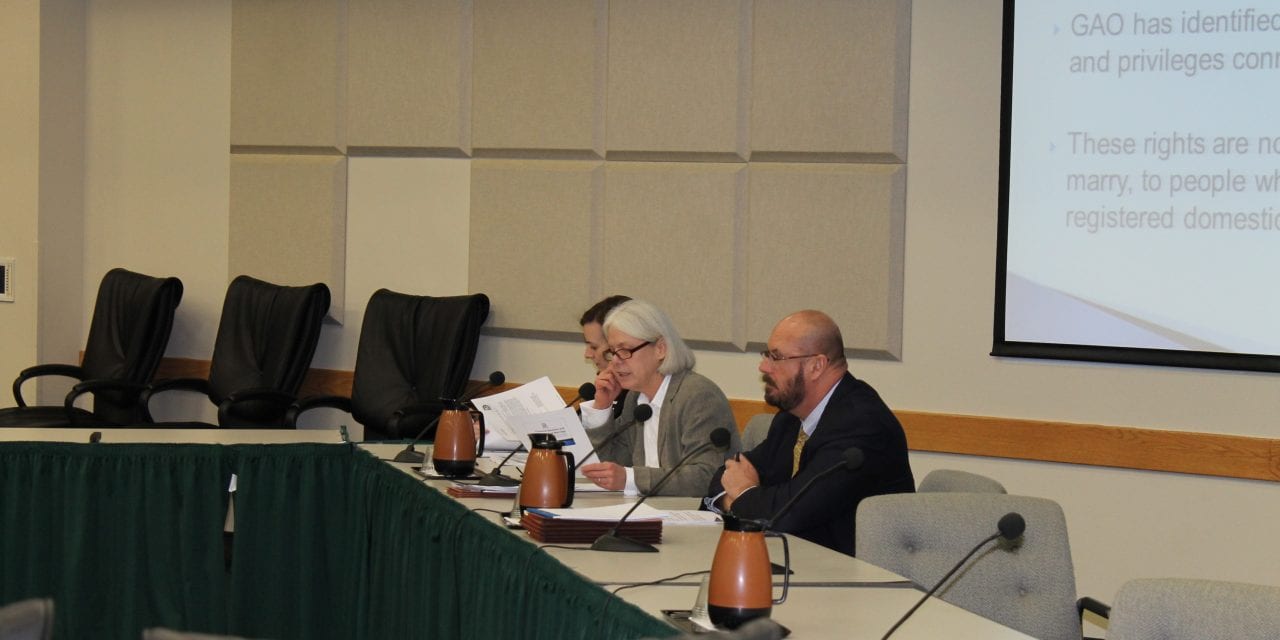
Openly gay city of Dallas employees Theresa O’Donnell and John Rogers addressed the committee Monday about the benefits of marriage equality. (Steve Ramos/Dallas Voice)
Several Dallas councilmembers called for a list of internal issues to be addressed where LGBT city employees are not treated equality compared to their heterosexual co-workers.
The request came Monday after two presentations before the Budget, Finance and Audit Committee, one on the financial benefits of marriage equality and one on the city’s 2002 nondiscrimination ordinance.
Theresa O’Donnell, interim assistant city manager, touched on many of the 1,138 rights same-sex coupes are denied without marriage, including health, tax, estate planning and death benefits.
Some of those benefits, like military and veteran benefits, are granted to legally married same-sex couples regardless of where they live, including Texas, which has a constitutional marriage amendment. Others, like Social Security, are limited to the state where the couple lives.
Councilman Jerry Allen, who chairs the committee, asked how the Supreme Court’s DOMA ruling allowing the federal government to recognize same-sex marriage complicated the issue by state.
John Rogers, assistant city attorney, said it complicates the matter greatly because for couples in different states “it’s going to be very, very confusing about what benefits and rights they can or can’t get” as the agencies over federal laws define what their policy will be.
“Marriage is a commitment but it’s a contract. It’s a commitment entering into a contract,” Allen said. “If you live in Texas, you don’t have the same rights that you would if you lived in Hawaii.”
Allen previously asked O’Donnell and Rogers to help research the issue of marriage equality after the equality resolution failed to go before the council for a vote last year. They briefed the committee on the DOMA decision in December and were asked to return to discuss the financial impact of marriage equality.
Councilman Scott Griggs asked about how the city’s pension benefits work. Rogers said employees receive 10 years of benefits. If a man’s wife dies, the wife gets benefits for life. But if a man’s husband dies, he is treated like any other beneficiary and the benefits eventually run out.
Rogers mentioned that the next briefing in February would address a list of programs and services within the city that could be changed, like the pension. Griggs then requested there be action items brought to the committee as well to see what could be addressed quickly.
Councilman Philip Kingston added that he’d like to see that list of items broken down into things that could be changed administratively and things that need council approval. The city’s LGBT Task Force, chaired by Councilman Adam Medrano, is working on a list of things it’d like to see changed. Medrano said at the meeting that the Task Force will work with the committee to address the issues that aren’t administrative.
Councilman Sheffie Kadane, who has spoken out against marriage equality based on his religious beliefs, asked if changes will be made without bringing up the state’s law. Rogers answered that depended on the change, but “that will be a consideration.”
Beverly Davis, assistant director of the Fair Housing Office, then briefed the committee on the city’s 2002 nondiscrimination ordinance. The measure prohibits bias in employment, housing, public accommodations and retaliation for filing a complaint based on an individual’s “real or perceived orientation as heterosexual, homosexual, or bisexual, or an individual’s real or perceived gender identity.”
If there’s cause, a case is filed in municipal court. Fines range from $200-$500. Of the 61 complaints filed since 2002, as of September, 56 percent have been in employment, 31 percent in housing and 14 percent in public accommodations.
But of those complaints, 38 have been found to have no cause. Others have been reconciled outside of court.
Melissa Miles, openly gay senior assistant attorney, said the numbers are misleading when asked about the effectiveness of the ordinance. She said the office does training at various events and for businesses. She used one example of a couple that didn’t want to file a complaint, but called the office after they’d been discriminated against in a restaurant. Officials ended up calling the restaurant and doing training with its staff. The owners later changed their policy to be more inclusive.
“The opportunity to educate under this policy, in my opinion, has had the most impact,” Miles said.
But government and religious entities are exempt under the ordinance. Kingston commented that the city doesn’t have to follow its own ordinance. Griggs later said the city has an internal nondiscrimination policy that includes sexual orientation and that policy and the ordinance should be compared to ensure the city is being held to “the same or higher standard.”
“I think that’s a worthwhile comparison,” Griggs said.
That comparison will be included when the committee meets again on Feb. 18, along with a list of possible changes and action items that could be voted on next month.
















